You know that guy who always has to contradict you? No matter the issue, big or small, he always has to dispute it, and always in the most callous of ways. You’ll usually find him at a party or any type of social gathering. After you’ve recited a splendid joke or anecdote, this asshole will miraculously appear like Nosferatu through a scary 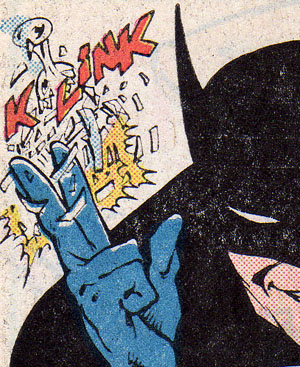 midnight fog. With a single, protesting finger pointed firmly in the air, he’ll dive head first into the middle of your conversation, brazenly destroying whatever level of amicability you’ve created among your enthralled listeners. Well, we’ve tracked down this annoying son of a bitch, and let him loose upon the readers of UTF in his very own editorial. Allow me to re-introduce our resident Contrarian Fanboy.
midnight fog. With a single, protesting finger pointed firmly in the air, he’ll dive head first into the middle of your conversation, brazenly destroying whatever level of amicability you’ve created among your enthralled listeners. Well, we’ve tracked down this annoying son of a bitch, and let him loose upon the readers of UTF in his very own editorial. Allow me to re-introduce our resident Contrarian Fanboy.
This week, we’re going to take a look at the much lauded graphic novel Watchmen. Written by Alan Moore during the Thatcher-Reagan era, this book marked a huge turning point for the world of comics. Even though it was printed by DC, it was an unusually provocative book…in a way that the Big Two had never been before.
At its heart, this story is an examination of a new world of superheroes, each incredibly flawed, and how each of them would discover the true cost for peace. Since its publication under the DC brand in 1986, it’s become the most revered comic in all of fanboy-dom, rivalled perhaps only by the Holocaust themed drama Maus. And after dozens of re-reads, I’ve come to a simple yet Earth-shattering conclusion…Watchmen isn’t as good as everyone’s been saying.
Now, before everyone starts marching to the offices of UTF with their pitchforks and torches, at least give me a chance to explain myself. I’ve found that Watchmen is championed for essentially two reasons:
It perfected the medium

People claim that Watchmen was the perfect book, or the closest to achieving such an accolade. But that’s not exactly true.
The perfect graphic novel would optimize every available facet of the medium, and there’s really only three as far as comics are concerned: narrative, dialogue, and artwork. As much as I love Dave Gibbons, he’s not the greatest comic artist in the world. I wouldn’t even put him in my top 10. Sure, he makes some great, iconic work…but when it comes down to sheer qualitative analysis, he just can’t compete with his peers from the time: Frank Miller, John Romita Jr., and Todd McFarlane….let alone modern guys like McNiven, Cho, and Lee.
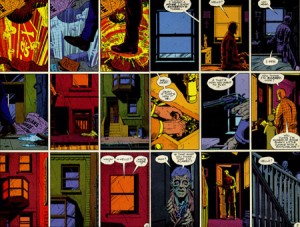 Gibbons’s art was a great match for Moore’s writing, though. There was something eerily near-perfect about following Rorshach from panel to panel as he prowled the streets of New York. Whenever I re-read the book, I love to indulge in those long, noir heavy passages, but even I have to admit they’re formulaic. The panel structure in the book is anything but perfect. Some, including me, would argue that it is excessively mundane with it’s cadence like structure of tiny frames. Sure, there were a few moments of utter spectacle, but for the most part, the panels flowed unremarkably from one small window to the next.
Gibbons’s art was a great match for Moore’s writing, though. There was something eerily near-perfect about following Rorshach from panel to panel as he prowled the streets of New York. Whenever I re-read the book, I love to indulge in those long, noir heavy passages, but even I have to admit they’re formulaic. The panel structure in the book is anything but perfect. Some, including me, would argue that it is excessively mundane with it’s cadence like structure of tiny frames. Sure, there were a few moments of utter spectacle, but for the most part, the panels flowed unremarkably from one small window to the next.
And I don’ think that’s necessarily Gibbons fault, but instead a reflection of Moore’s script. That same script is responsible for the second biggest fault that I found with Watchmen: its over saturation of prose. Comics are a mixed medium of writing and illustrative art, and whenever you feature one more heavily than the other, you strip away from a delicate duality. Moore’s insistence on heavy narrative along with his voluminous dialogue really detracted from the pace of the book. Don’t get me wrong, I was still engaged as a reader, but paying attention to page after page of condensed writing delved into the world of tedium.
 All of this leads into the biggest blunder in the book, which is the callously inserted addendums at the end of every issue. Who does that!?!?!? This medium is all about the marriage between script and art…and as I’ve said before, favoring either side of that partnership is the downfall of many great books, and Watchmen is among the casualties. Moore had 12 issues and somewhere around 400 pages to deliver enough back story about his unique universe. If he couldn’t cram every bit of information into that length, then it’s an indication that there’s something seriously wrong with the foundation of the story. Now, I know some of you might argue “the addendum’s were just FYI and not critical to the story”…but that’s not true. They were intricate to the development of the plot and intended to be read at the end of every issue. Moore says as much in his interviews and simply relabeling them as Hollis Mason‘s autobiography doesn’t forgive the fact that they’re actually reference material for the greater story.
All of this leads into the biggest blunder in the book, which is the callously inserted addendums at the end of every issue. Who does that!?!?!? This medium is all about the marriage between script and art…and as I’ve said before, favoring either side of that partnership is the downfall of many great books, and Watchmen is among the casualties. Moore had 12 issues and somewhere around 400 pages to deliver enough back story about his unique universe. If he couldn’t cram every bit of information into that length, then it’s an indication that there’s something seriously wrong with the foundation of the story. Now, I know some of you might argue “the addendum’s were just FYI and not critical to the story”…but that’s not true. They were intricate to the development of the plot and intended to be read at the end of every issue. Moore says as much in his interviews and simply relabeling them as Hollis Mason‘s autobiography doesn’t forgive the fact that they’re actually reference material for the greater story.
Strictly from a qualitative stand-point, Watchmen is not the best book ever. It doesn’t excel far beyond other great comics in any specific category, and even when considering the project as a whole, it shines no brighter against oft-cited competitors like Maus or The Dark Knight Returns.
Ground Breaking Themes
There’s another basic reason that Watchmen is considered the greatest besides its structural achievements, and that’s its concepts. These were themes that had supposedly never before been explored…deeply considered murderous plots, bloody and realistic vengeance stories, and an honest conversation about power and those who wield it. But these aren’t really original ideas in the world of comics. Even in their most ‘high-minded’ form, we can find well orchestrated books that delve head first into these issues, and I’m not just talking about obscure Indie labels either. I’m talking about honest blockbusters.
 One of the most obvious examples I can think of is the Days of Future Past story arch, written by the famous duo of Chris Claremont and John Byrne. The X-Men has always been a particularly weighted book when it comes to social issues, but this mini-series was even more so. If you’re only familiar with this run in name-only, allow me to quickly summarize it. After one of their many fights with the evil Brotherhood, the X-Men were unable to stop the terrorist muties from assassinating Senator Robert Kelly. A maelstrom of events soon follows, all leading up to a dystopian future where the X-Men and the rest of mutant kind are imprisoned in concentration camps and Sentinels rule the United States.
One of the most obvious examples I can think of is the Days of Future Past story arch, written by the famous duo of Chris Claremont and John Byrne. The X-Men has always been a particularly weighted book when it comes to social issues, but this mini-series was even more so. If you’re only familiar with this run in name-only, allow me to quickly summarize it. After one of their many fights with the evil Brotherhood, the X-Men were unable to stop the terrorist muties from assassinating Senator Robert Kelly. A maelstrom of events soon follows, all leading up to a dystopian future where the X-Men and the rest of mutant kind are imprisoned in concentration camps and Sentinels rule the United States.
The Future Past story-arch is a remarkable publication, especially because it came from Marvel. It’s dialogue is realistic, the situations are dredged in layers of issues all teeming with social implications, and it’s an all around great read. Did I mention that it was published in 1981, five whole years before Watchmen was released under DC’s imprint. That takes a few marks off of the old “ground-breaking” accolade that’s been attributed to Moore’s work.
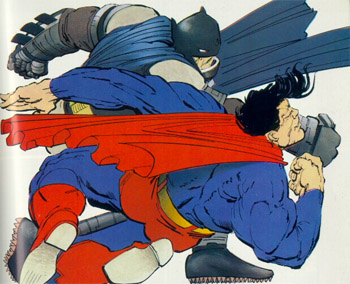 Now, you might think this is just one instance of a book achieving what’s been usually attributed to Moore’s Watchmen, but there’s plenty more. Are you familiar with Frank Millers The Dark Knight Returns? It’s a darkly twisted, dystopian tale of Bruce Wayne’s return as Gotham’s hero. Yea…it sounds a lot like Christopher Nolan’s The Dark Knight Rises, but even more importantly than that, it sounds a lot like Moore’s Watchmen.
Now, you might think this is just one instance of a book achieving what’s been usually attributed to Moore’s Watchmen, but there’s plenty more. Are you familiar with Frank Millers The Dark Knight Returns? It’s a darkly twisted, dystopian tale of Bruce Wayne’s return as Gotham’s hero. Yea…it sounds a lot like Christopher Nolan’s The Dark Knight Rises, but even more importantly than that, it sounds a lot like Moore’s Watchmen.
This Batman tale is set in a crime-riddled Gotham where mutant renegades roam the streets and a Reagan-like president rules the country as part of a sinister, unrecognized coupe. Bats is forced to return in order to clean the city no matter what stands in his way…even if it’s a Big Blue Boyscout. Admittedly, this series has received its fair share of criticism. Miller is certainly recognized as a character vampire of sorts. After all, his greatest works are those in which he takes iconic characters, sucks them of their original ethos, and replaces them with some type of weird amalgam of morality and barbarism. If all of that sounded too convoluted…then just read this The Dark Knight Returns and you’ll see what I’m talking about.
But regardless of tactics, Miller’s story of a dystopian Gotham covered all of the ‘ground-breaking’ points that Moore’s Watchmen did…and many would contend that Miller’s take was better. Oh, and The Dark Knight Rises was released in February 1986, completing its four-issue run by June…three whole months before the first issue of Watchmen.
So there you have it…the reasons why I don’t think Watchmen is all it’s cracked up to be. Think I’m right? Think I’m full of s***? Don’t hesitate! Sound off in the comments below. This is Contrarian Fanboy after all…let’s get this war zone started.

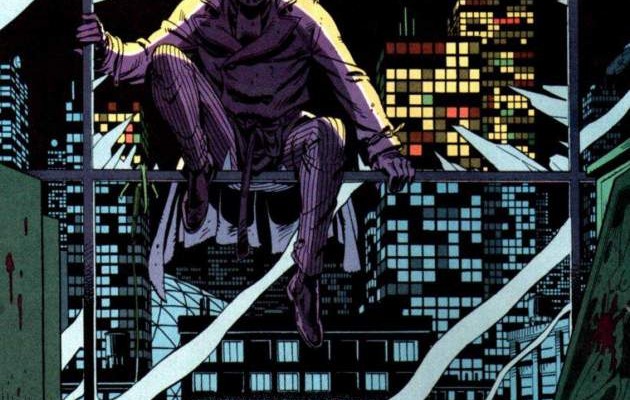

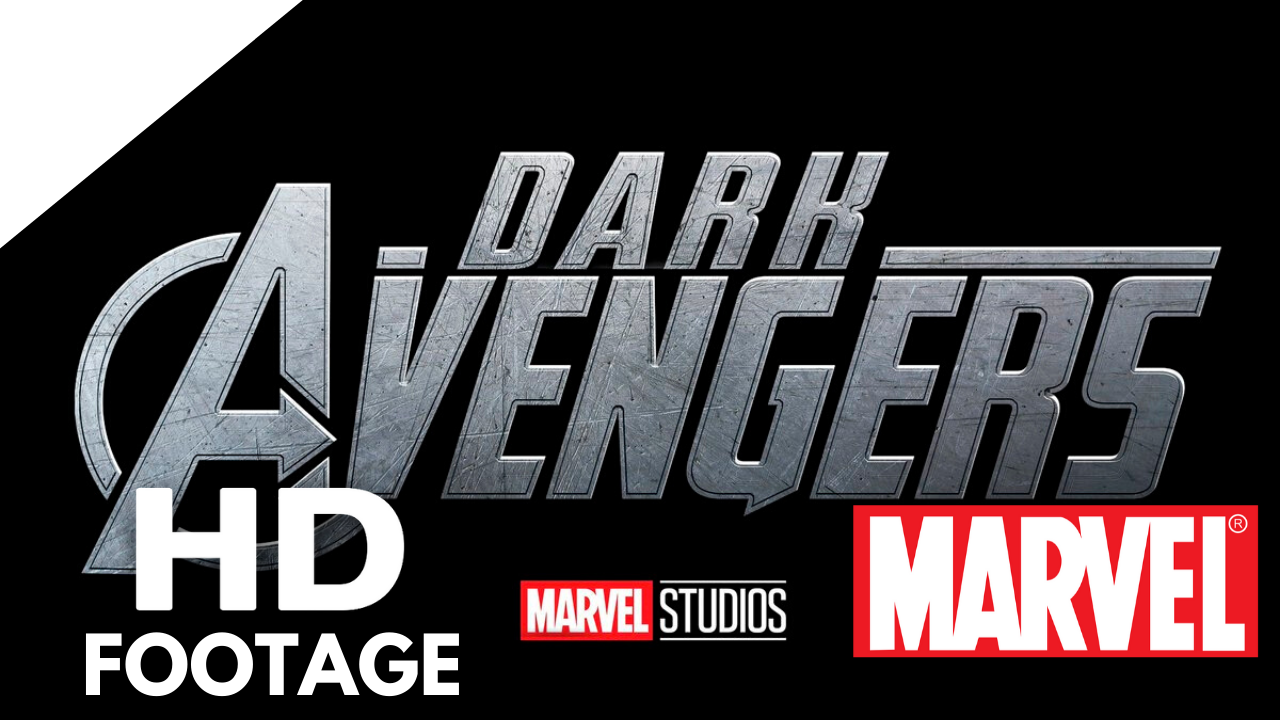





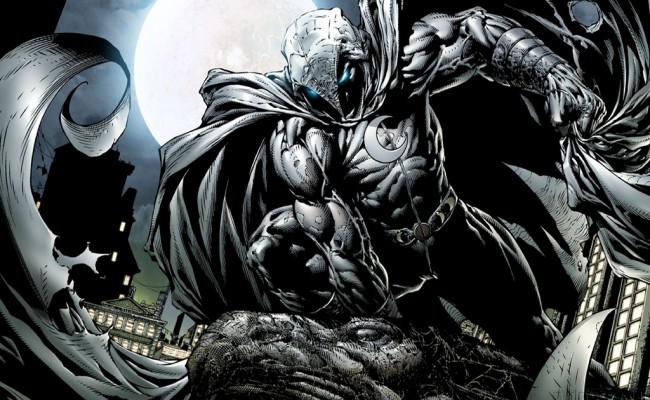



S#!T Talking Central